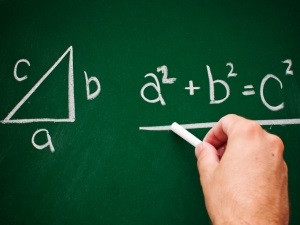
As matriculants across the country sit for their first mathematics exam today, the Department of Basic Education (DBE) faces a mounting challenge to meet its mathematics, science and technology (MST) subject priorities as the number of registered candidates declines with each passing year.
Of the 551 656 full-time matric students writing the National Senior Certificate (NSC) exams this year, 231 180 (41%) are registered for mathematics, excluding Mathematics Literacy, according to DBE spokesperson Troy Martens. This is compared to 42% last year, as indicated in an analysis document of NSC performances. Meanwhile, the figures between 2010 and 2012 show the percentage of students registered for the subject fell from 48%, to 45% and then 44%.
Martens adds 171 549 students will write the physical science exam this year - around 31% of the total. This is compared to 38% in 2010, 36% in 2011, 35% in 2012 and 32% last year.
Although pass rates for both subjects have improved over the past few years, industry commentators say declining student participation does not bode well for SA's future technology skills pool.
ICT veteran Adrian Schofield says the failure to equip more people with rudimentary maths skills is an indictment on the DBE. "Sadly, we have apparently done nothing to reverse the trend, having identified it as a significant contributor to the problems of getting young people qualified and into work. It's not just about increasing the pool of potential ICT workers, but using maths to develop our logical thinking."
He adds current industry interventions to bridge the skills gap by offering training programmes may not be enough in the long-run. "They are doing what they can out of desperation to ensure there is a strong pool of people with good basic education."
Sweeping changes?
The DBE has mulled drastic measures to the way students are taught and tested, and these were included in a recent ministerial task team report that looked at proposals of raising the pass mark to 40%, making mathematics compulsory at all schools, and introducing more stringent university entrance requirements.
The task team expressed concern at the increasing number of schools that did not offer maths at all. In 2008, 150 schools did not offer maths and the figure grew to 286 in 2012.
But focusing on the minimum pass requirement is a "red herring", according to Graeme Bloch, visiting adjunct professor at the University of Witwatersrand Public and Development Management School. He says the main issue should be on improving the quality of passes, rather than ensuring the bare minimum is met.
Moira De Roche, MD of e-learning company Aligned4Learning, says although government has targeted improved teacher training and assessments, it could tap into technology to share resources among multiple schools - as is the case in interactive TV learning programmes.
"Options like Webinars or other technologies could make better use of reaching a greater amount of students in areas that are under-resourced, but we can't just put it out there and expect kids to come. You have to encourage people to use the technologies in order to make the best out of them," she says.
Share